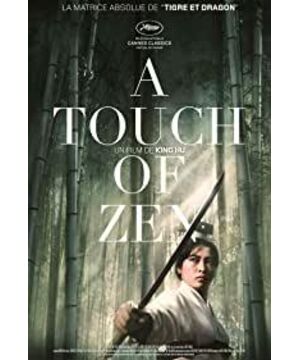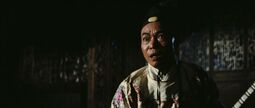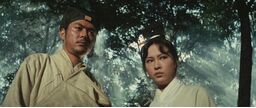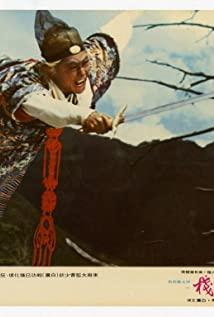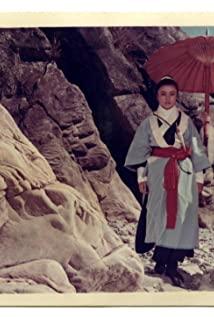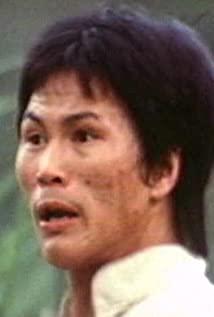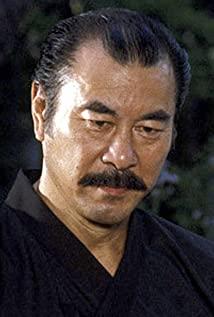I’ll just post here some of the analysis I prepared for the class discussion at the time: Soundtrack: Three hours of almost non-stop classical music, very soft and slow when Gu Shengzhai gets along with his mother, the background of the fight at Jinglutun Fort The music is sometimes loud and cut, sometimes soft and slow, and it feels that the whole movie is not silent for a second, or the vocals (speaking, fighting) are louder and the background music is weaker, or there is no one making a sound but the soundtrack is very good. protrude. There is also dubbing, in addition to the sounds in nature (the sound of wind, rain, running water, etc.), it is the actor's lines, which are the kind of words that are eloquent and feel very serious. Because the adapted plot is not complicated, and the relationship between the characters is relatively simple, and there is a lot of time without vocals in the play, and it is rare in my impression that a character has a long line or continuous dialogue, and the vocal lines are slightly less. Somewhat abrupt and exaggerated. The sound and the performance complement each other interestingly. The most direct feeling to people is that they are back on the stage. The full of emotions, the precise lines are matched with the guqin and other classical instruments, and the unhurried progress of the plot is deeply loved by the dramas of Yuan, Ming and Qing Dynasties. performance impact. This kind of transitional film is a transition between tradition and modernity, and it is a unique historical memory. From the point of view of our later generations, of course, it has great pioneering significance. This is the pioneering work of martial arts drama. The fight in the bamboo forest has a profound impact on the later "Crouching Tiger, Hidden Dragon" and "House of Flying Daggers", whether it is photography Editing, composition, action or suspense setting, and dialogue setting are all models and demonstrations for later films. In my opinion, the value of this film also lies in the summary of the past, 1. the background of the middle and late Ming Dynasty, costumes and make-up, old buildings, and details of calligraphy and painting; 2. green landscapes, desert Gobi, ancient temples, bamboo forests and reeds , they are all classic elements. This generation is still educated in the period of the Republic of China. They have a solid foundation in old school and have a deep understanding of these classical elements. There was no photography technology in ancient times. The form remains, these people recorded their understanding of traditional martial arts stories vividly in the 1960s, which is equivalent to preserving the memory for future generations. A '60s and '70s - an era of transition find a buffered work (or the resulting series) as a reference, at least to see how that generation understood the canon, rather than jumping straight to a few hundred years ago , using today's more stereotyped thinking, almost across a cultural fault, to interpret the Chinese elements in ancient texts and ancient paintings. I watched the three-hour movie meticulously, and went back to read Pu Songling's original work carefully, feeling regrets on both ends. film a paradox The point is that it is too long and makes people feel missing. This is not the lack of endings (on the contrary, I think he is too full of endings), but the lack of background and key plots, and in Some places are too procrastinated and don't look very cool. I have been thinking these days that the original novel is too novel and the movie is more prose, but in my opinion, this story is more suitable for a four-fold play: the wedge explains the life of Gu Xingzhai and his mother in the small town; Ouyang Nian met with Yang Huizhen, Shi, and Lu two generals, and the main characters appeared once; in the second part of the conflict, Ouyang Nian fought with Lu, Shi and Yang Huizhen secretly, and Yang Huizhen and Gu Xingzhai Chunxiao once The climax of the third fold is the decisive battle between Yang Huizhen and Menda. At the end of the fourth fold, Master Huiyuan and Yang Shilu fought against Xu Xianchun, Xu Xianchun and his sons were killed, and the injured Master Huiyuan passed away. . The end. In fact, it was originally a very concise mode of beginning and developing climax and ending, but the ending is not a continuation of the climax but a new theme. "Zen" is not impossible to shoot, but it is difficult to explain clearly in the limited space. A general sublimation. What are the benefits of changing it into a play? First of all, of course, the music set and the lyrics are all in one's hands, and I have always been interested in the long dialogue or monologue before each fold, which is very suitable for explaining the background, especially if the story is compressed into four In the excerpt, Yang Huizhen's experience of escaping from the capital all the way to desperation and being rescued by Huiyuan many times can be completely told by Yang Huizhen herself. Another advantage is time. After watching the movie, students generally say that some timelines are inexplicable, such as Yang Huizhen’s pregnancy, fighting with Menda, leaving Gu Shengzhai and giving birth. In fact, there is no explanation for the period, so Gu Xingzhai found In that temple, I found out that his son was already quite young (it was definitely more than a year anyway), but since the entire film had few lines and the characters were relatively silent and reserved, there was no explanation for this; if it were a drama, Gu would Xingzhai said a few words at the beginning of the fourth fold: "Since the battle with Menda, where did you leave your family and leave your mother? The green hills and moraine have been traversed. I've been tossing and turning..." This kind of (the limericks I made up without thinking! I think a person can write better than me!), at least smooth the timeline. Once again, I sigh that Zaju is a rare art form. It is very expressive to be able to tell a story that is watertight, with characters, content and themes in such a limited space. The lack of key plot, and in some places too procrastination, does not look very cool. I have been thinking these days that the original novel is too novel and the movie is more prose, but in my opinion, this story is more suitable for a four-fold play: the wedge explains the life of Gu Xingzhai and his mother in the small town; Ouyang Nian met with Yang Huizhen, Shi, and Lu two generals, and the main characters appeared once; in the second part of the conflict, Ouyang Nian fought with Lu, Shi and Yang Huizhen secretly, and Yang Huizhen and Gu Xingzhai Chunxiao once The climax of the third fold is the decisive battle between Yang Huizhen and Menda. At the end of the fourth fold, Master Huiyuan and Yang Shilu fought against Xu Xianchun, Xu Xianchun and his sons were killed, and the injured Master Huiyuan passed away. . The end. In fact, it was originally a very concise mode of beginning and developing climax and ending, but the ending is not a continuation of the climax but a new theme. "Zen" is not impossible to shoot, but it is difficult to explain clearly in the limited space. A general sublimation. What are the benefits of changing it into a play? First of all, of course, the music set and the lyrics are all in one's hands, and I have always been interested in the long dialogue or monologue before each fold, which is very suitable for explaining the background, especially if the story is compressed into four In the excerpt, Yang Huizhen's experience of escaping from the capital all the way to desperation and being rescued by Huiyuan many times can be completely told by Yang Huizhen herself. Another advantage is time. After watching the movie, students generally say that some timelines are inexplicable, such as Yang Huizhen’s pregnancy, fighting with Menda, leaving Gu Shengzhai and giving birth. In fact, there is no explanation for the period, so Gu Xingzhai found In that temple, I found out that his son was already quite young (it was definitely more than a year anyway), but since the entire film had few lines and the characters were relatively silent and reserved, there was no explanation for this; if it were a drama, Gu would Xingzhai said a few words at the beginning of the fourth fold: "Since the battle with Menda, where did you leave your family and leave your mother? The green hills and moraine have been traversed. I've been tossing and turning..." This kind of (the limericks I made up without thinking! I think a person can write better than me!), at least smooth the timeline. Once again, I sigh that Zaju is a rare art form. It is very expressive to be able to tell a story that is watertight, with characters, content and themes in such a limited space. The lack of key plot, and in some places too procrastination, does not look very cool. I have been thinking these days that the original novel is too novel and the movie is more prose, but in my opinion, this story is more suitable for a four-fold play: the wedge explains the life of Gu Xingzhai and his mother in the small town; Ouyang Nian met with Yang Huizhen, Shi, and Lu two generals, and the main characters appeared once; in the second part of the conflict, Ouyang Nian fought with Lu, Shi and Yang Huizhen secretly, and Yang Huizhen and Gu Xingzhai Chunxiao once The climax of the third fold is the decisive battle between Yang Huizhen and Menda. At the end of the fourth fold, Master Huiyuan and Yang Shilu fought against Xu Xianchun, Xu Xianchun and his sons were killed, and the injured Master Huiyuan passed away. . The end. In fact, it was originally a very concise mode of beginning and developing climax and ending, but the ending is not a continuation of the climax but a new theme. "Zen" is not impossible to shoot, but it is difficult to explain clearly in the limited space. A general sublimation. What are the benefits of changing it into a play? First of all, of course, the music set and the lyrics are all in one's hands, and I have always been interested in the long dialogue or monologue before each fold, which is very suitable for explaining the background, especially if the story is compressed into four In the excerpt, Yang Huizhen's experience of escaping from the capital all the way to desperation and being rescued by Huiyuan many times can be completely told by Yang Huizhen herself. Another advantage is time. After watching the movie, students generally say that some timelines are inexplicable, such as Yang Huizhen’s pregnancy, fighting with Menda, leaving Gu Shengzhai and giving birth. In fact, there is no explanation for the period, so Gu Xingzhai found In that temple, I found out that his son was already quite young (it was definitely more than a year anyway), but since the entire film had few lines and the characters were relatively silent and reserved, there was no explanation for this; if it were a drama, Gu would Xingzhai said a few words at the beginning of the fourth fold: "Since the battle with Menda, where did you leave your family and leave your mother? The green hills and moraine have been traversed. I've been tossing and turning..." This kind of (the limericks I made up without thinking! I think a person can write better than me!), at least smooth the timeline. Once again, I sigh that Zaju is a rare art form. It is very expressive to be able to tell a story that is watertight, with characters, content and themes in such a limited space. The second scene; the second round of conflicts gradually arises, Ouyang Nian and the two generals Lu and Shi and Yang Huizhen are secretly fighting wits and courage, Yang Huizhen and Gu Xingzhai Chunxiao once; the third round reaches the climax, that is, Yang Huizhen and Menda group. At the end of the fourth fold, Master Huiyuan and Yang Shilu fought against Xu Xianchun, Xu Xianchun and his sons were killed, and the injured Master Huiyuan passed away. The end. In fact, it was originally a very concise mode of beginning and developing climax and ending, but the ending is not a continuation of the climax but a new theme. "Zen" is not impossible to shoot, but it is difficult to explain clearly in the limited space. A general sublimation. What are the benefits of changing it into a play? First of all, of course, the music set and the lyrics are all in one's hands, and I have always been interested in the long dialogue or monologue before each fold, which is very suitable for explaining the background, especially if the story is compressed into four In the excerpt, Yang Huizhen's experience of escaping from the capital all the way to desperation and being rescued by Huiyuan many times can be completely told by Yang Huizhen herself. Another advantage is time. After watching the movie, students generally say that some timelines are inexplicable, such as Yang Huizhen’s pregnancy, fighting with Menda, leaving Gu Shengzhai and giving birth. In fact, there is no explanation for the period, so Gu Xingzhai found In that temple, I found out that his son was already quite young (it was definitely more than a year anyway), but since the entire film had few lines and the characters were relatively silent and reserved, there was no explanation for this; if it were a drama, Gu would Xingzhai said a few words at the beginning of the fourth fold: "Since the battle with Menda, where did you leave your family and leave your mother? The green hills and moraine have been traversed. I've been tossing and turning..." This kind of (the limericks I made up without thinking! I think a person can write better than me!), at least smooth the timeline. Once again, I sigh that Zaju is a rare art form. It is very expressive to be able to tell a story that is watertight, with characters, content and themes in such a limited space. The second scene; the second round of conflicts gradually arises, Ouyang Nian and the two generals Lu and Shi and Yang Huizhen are secretly fighting wits and courage, Yang Huizhen and Gu Xingzhai Chunxiao once; the third round reaches the climax, that is, Yang Huizhen and Menda group. At the end of the fourth fold, Master Huiyuan and Yang Shilu fought against Xu Xianchun, Xu Xianchun and his sons were killed, and the injured Master Huiyuan passed away. The end. In fact, it was originally a very concise mode of beginning and developing climax and ending, but the ending is not a continuation of the climax but a new theme. "Zen" is not impossible to shoot, but it is difficult to explain clearly in the limited space. A general sublimation. What are the benefits of changing it into a play? First of all, of course, the music set and the lyrics are all in one's hands, and I have always been interested in the long dialogue or monologue before each fold, which is very suitable for explaining the background, especially if the story is compressed into four In the excerpt, Yang Huizhen's experience of escaping from the capital all the way to desperation and being rescued by Huiyuan many times can be completely told by Yang Huizhen herself. Another advantage is time. After watching the movie, students generally say that some timelines are inexplicable, such as Yang Huizhen’s pregnancy, fighting with Menda, leaving Gu Shengzhai and giving birth. In fact, there is no explanation for the period, so Gu Xingzhai found In that temple, I found out that his son was already quite young (it was definitely more than a year anyway), but since the entire film had few lines and the characters were relatively silent and reserved, there was no explanation for this; if it were a drama, Gu would Xingzhai said a few words at the beginning of the fourth fold: "Since the battle with Menda, where did you leave your family and leave your mother? The green hills and moraine have been traversed. I've been tossing and turning..." This kind of (the limericks I made up without thinking! I think a person can write better than me!), at least smooth the timeline. Once again, I sigh that Zaju is a rare art form. It is very expressive to be able to tell a story that is watertight, with characters, content and themes in such a limited space. Poetry introduction Binbai is naturally trustworthy, and I have always been interested in the long dialogue or monologue before each fold, which is simply too suitable for explaining the background, especially if the story is compressed into a four-fold play, Yang Huizhen San Yang Huizhen's experience of escaping from the capital all the way to desperation and being rescued by Huiyuan many times can be completely told by Yang Huizhen herself. Another advantage is time. After watching the movie, students generally say that some timelines are inexplicable, such as Yang Huizhen’s pregnancy, fighting with Menda, leaving Gu Shengzhai and giving birth. In fact, there is no explanation for the period, so Gu Xingzhai found In that temple, I found out that his son was already quite young (it was definitely more than a year anyway), but since the entire film had few lines and the characters were relatively silent and reserved, there was no explanation for this; if it were a drama, Gu would Xingzhai said a few words at the beginning of the fourth fold: "Since the battle with Menda, where did you leave your family and leave your mother? The green hills and moraine have been traversed. I've been tossing and turning..." This kind of (the limericks I made up without thinking! I think a person can write better than me!), at least smooth the timeline. Once again, I sigh that Zaju is a rare art form. It is very expressive to be able to tell a story that is watertight, with characters, content and themes in such a limited space. Poetry introduction Binbai is naturally trustworthy, and I have always been interested in the long dialogue or monologue before each fold, which is simply too suitable for explaining the background, especially if the story is compressed into a four-fold play, Yang Huizhen San Yang Huizhen's experience of escaping from the capital all the way to desperation and being rescued by Huiyuan many times can be completely told by Yang Huizhen herself. Another advantage is time. After watching the movie, students generally say that some timelines are inexplicable, such as Yang Huizhen’s pregnancy, fighting with Menda, leaving Gu Shengzhai and giving birth. In fact, there is no explanation for the period, so Gu Xingzhai found In that temple, I found out that his son was already quite young (it was definitely more than a year anyway), but since the entire film had few lines and the characters were relatively silent and reserved, there was no explanation for this; if it were a drama, Gu would Xingzhai said a few words at the beginning of the fourth fold: "Since the battle with Menda, where did you leave your family and leave your mother? The green hills and moraine have been traversed. I've been tossing and turning..." This kind of (the limericks I made up without thinking! I think a person can write better than me!), at least smooth the timeline. Once again, I sigh that Zaju is a rare art form. It is very expressive to be able to tell a story that is watertight, with characters, content and themes in such a limited space.
View more about A Touch of Zen reviews


